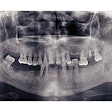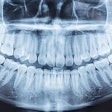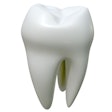NEW YORK (Reuters Health) Oct. 10 A new study has found no link between breastfeeding and tooth decay in very young children.
But the researchers did find that Mexican-American children, those living in poverty and those whose mothers smoked during pregnancy were at greater risk of dental caries, or tooth decay.
"It's clear that we need more study to understand how these factors are actually related to dental cavities in young children," Dr. Hiroko Iida of the University of Rochester in New York, the study's lead author, told Reuters Health.
Some research has suggested that extended breastfeeding might increase the risk of tooth decay; for example, one study in animals found that human breast milk promoted caries more readily than did cow's milk, Iida and colleagues point out in the October issue of Pediatrics.
To further investigate the association, the researchers looked at 1,576 children between the ages of two and five who were participating in the National Health and Nutrition Examination Survey, 27.5 percent of whom had caries. Sixty percent of the children had been breastfed.
There was no link between whether or not a child was breastfed, or for how long, and their risk of having tooth decay, the researchers found. But poor children and Mexican-American children were at greater risk of having tooth decay, and were also more likely to have severe tooth decay. Children whose mothers had smoked while they were pregnant or did so currently were also at increased risk.
It's possible that maternal smoking could simply be a marker for other unhealthy habits, such as poor diet and poor oral hygiene, Iida pointed out, while smoke exposure itself may also promote tooth decay. Poverty has been linked to a number of factors that can worsen dental health, the researcher added, such as limited access to dental health services or limited use of available services.
To ensure their children have the healthiest teeth and gums possible, parents should wash an infant's gums with a wet washcloth daily, Iida recommended. Once a child's first tooth appears, it should be cleaned after each feeding. A child's first visit to the dentist should occur within six months after her first tooth appears, and at no later than one year of age, the researcher added, while young children should generally have checkups every six months.
"We recommend the first dental visit early because there's sufficient evidence that dental cavities can begin to form well before the second birthday," Iida said.
Pediatrics, October 2007.
Copyright © 2007 Reuters Limited. All rights reserved. Republication or redistribution of Reuters content, including by framing or similar means, is expressly prohibited without the prior written consent of Reuters. Reuters shall not be liable for any errors or delays in the content, or for any actions taken in reliance thereon. Reuters and the Reuters sphere logo are registered trademarks and trademarks of the Reuters group of companies around the world.


















